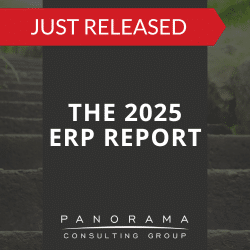This scenario is probably making your stomach churn. No one wants to waste time and money. That’s why many organizations take a proactive approach to risk mitigation. In other words, they develop a risk management plan before selecting ERP software. They also assess their project plan to ensure it has the right activities and right level of detail. In addition, they perform continual assessments throughout their project.
Why Assess Your ERP Implementation?
- You’ll have a comprehensive view of your project activities, performance and risks.
- You can detect errors early and proactively prevent errors.
- You’ll minimize implementation risk and cost.
How to Assess Your ERP Implementation
1. Conduct Stage Gate Reviews
Stage gate reviews ensure the quality and completeness of your project plan. At the end of each implementation stage, the executive team and project team should determine if every deliverable for that stage is complete before moving on to the next stage.
This is also the time to assess the quality of work. Are you addressing business aspects, such as change management, or are you just focusing on technical aspects? What methodology and templates are you using? As you identify risks, you can include them in your risk management plan.
Stage gate reviews can reduce your likelihood of needing project recovery services, which is a last resort for many organizations. Even organizations pursuing digital transformation can inadvertently skip key project activities and find themselves in need of project recovery.
The 2025 ERP Report
72.6% of respondents said they've already deployed AI at their organizations. Learn about AI adoption and other ERP trends by downloading our latest report.
2. Assess Your Project Management and Governance
Effective project management can mitigate many project risks. A good project manager knows who’s in charge of managing the project budget and timeline and has a good understanding of the roles and responsibilities of project team members. If this doesn’t sound like your project, it’s not too late to develop strong project governance. Panorama’s ERP consultants provide project auditing services that help organizations stay on-budget and realize expected business benefits.
3. Focus on Organizational Change Management
When assessing your project plan, you might notice it’s a little heavy on technical activities and little light on people-related activities. Do you have a plan for identifying and mitigating change resistance? Do you understand the impact of change on each department and individual employees?
Your project plan should include change management activities that promote two-way communication and drive awareness of project goals. Communication works best when it’s informed by employees’ needs and concerns. By investigating the reasons for change resistance and determining the skillsets employees lack, you can develop a change management plan that addresses the entire organization – at the department and individual level.
4. Focus on Business Process Reengineering
Your project plan may be lacking a focus on business processes. If so, business process reengineering may be a good addition to your project plan. Business process reengineering ensures a new ERP system has the functionality to support your organization’s goals. Involving subject matter experts helps you determine business requirements and identify opportunities for process improvement.
For every process you improve or redesign, change management becomes more essential, so be sure your project plan considers the interdependency between business process reengineering and organizational change management. For example, you’ll need to document the change impacts of each redesigned process.
5. Assess Your Data Migration Plan
Organizations that develop a data strategy prior to implementing ERP software are more successful with data migration. The process is still arduous, but it doesn’t cause operational disruption. These organizations spend time defining the scope of data conversion and assessing data cleanliness.
A best practice for data migration is setting milestones and conducting multiple conference room pilots. Aim to have 25% of your data converted and cleansed for the first conference room pilot, 50-75% for the second and 100% for the third.
6. Assess Your Level of Customization
Software customization is costly, so it’s important to plan for it early in the project to avoid going over budget. While assessing your project governance around customization, you may find a lack of project controls.
Good project governance for customization includes predefined customization limits and a formal approval process for change orders. Executives should have the final say when it comes to additional customization. They will decide if it’s worth the extra cost by investigating the reasons behind the change order – did it originate from employees’ resistance to process changes or is it aligned with the organization’s digital strategy and competitive advantage?
What if You Identify Major Risks?
While assessing your ERP implementation, you may find holes in your project plan. It’s not uncommon for organizations to skip change management and business process management in order to accelerate their implementation. Even organizations pursuing digital transformation tend to overlook certain change management activities.
Fortunately, revising a project plan isn’t difficult if the project is still in its early phases. Most executives will not object to more project controls around customization. Some may object to organizational change management, but developing a business case can help you show the value of change readiness.
Panorama’s ERP consultants can help you assess risk, and if necessary, help you revise your project plan. Request a free consultation below.













